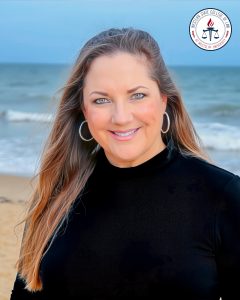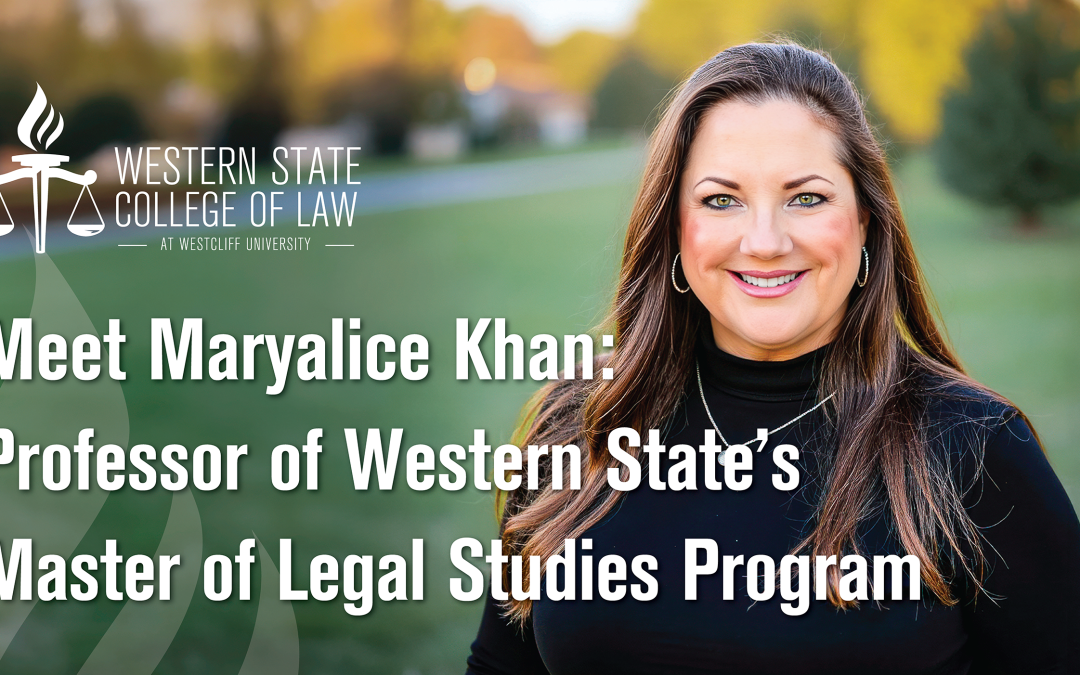Written by: WSCL Marketing Team
A Unique Perspective: From the Hospital to the Courtroom

Professor Maryalice Khan stands out as an educator with a rare blend of experience in healthcare and the law. As a registered nurse and licensed California attorney, she has seen the healthcare system from all angles—patient care, regulatory oversight, and now, as a professor for Western State College of Law’s Master of Legal Studies (MLS) program.
Her journey into healthcare and law didn’t follow a straight path. “I was a mom first, and then I went to nursing school because I always wanted to help others. Like most people who choose healthcare fields, I did it because I care about people,” she reflects. While completing her bachelor’s degree in nursing, Maryalice took a class on health law—and it changed everything. “From the very first class, I knew I had to go to law school. Suddenly, I had this deep curiosity about how the law worked with healthcare. And since I already worked as a nurse for several years, I thought the law would be very fascinating.”
After finishing her bachelor’s degree, Maryalice made the leap and started going to law school full-time, diving headfirst into the stuff that interested her most: healthcare law and compliance. That choice set her on a path where she could blend both her passions. Over the next two decades, she built a career in regulatory compliance and delegation oversight. Along the way, she also earned her healthcare compliance certification.
Teaching for Impact: Courses that Prepare You for the Real World
In Western State’s MLS program, Professor Khan will initially be teaching courses on Medicare and Medicaid law, public health law, risk management, and the development of effective compliance programs. Each course is designed to give students a deep, practical understanding of the laws and regulations that govern the modern healthcare landscape.
What can students expect from her classes? “We talk about why the law is there, the intent behind it, the requirements for compliance, and, crucially, the consequences of noncompliance,” Maryalice says. “There’s always an interesting history about how these laws came to be—usually because one bad apple ruined the whole box. Understanding that intent helps us see why tenacious compliance is needed in every organization.”
Maryalice emphasizes the high stakes involved in healthcare compliance, stressing the importance of being vigilant to prevent costly mishaps. She explains that a single oversight can have far-reaching consequences throughout an organization, highlighting the critical importance of staying vigilant. “Consequences can range from corrective action plans to monetary fines, criminal charges, or even the loss of a business,” she explains. “The United States Sentencing Guidelines play a role, and sometimes a single compliance failure can have ripple effects throughout an organization.”
Professor Khan encourages her students to focus on working out proactive solutions and a consistent commitment to doing what’s right. “Today, there may be gaps to be addressed; however, the goal is always to ensure we’re consistent, understand the requirements, and do our best to anticipate and prevent problems before they start.”
Why the MLS in Healthcare Compliance Matters
Maryalice believes this is a great time to become an expert in healthcare compliance. “We live in a highly regulated, complex healthcare market. Not just in the U.S., but internationally,” she states. Maryalice points out that organizations like the Joint Commission and NCQA set standards around the world. This means the expertise students gain in this program can take them anywhere internationally.
The MLS in Healthcare Compliance offers more than just a credential. “Students will be exposed to the laws and regulations, learn how to analyze and navigate their complexities, and gain the practical skills to succeed wherever they work,” Maryalice says. “Having an MLS is incredibly valuable because it prepares you to handle the real challenges you’ll face in the field.”
A degree is something Maryalice considers essential for anyone serious about compliance. She shares that, even after earning her J.D., she herself obtained certification by the Health Care Compliance Association. “It really shows you meet the industry standard,” she says. “It makes a real difference to employers.”
Shaping the Next Generation of Compliance Leaders
Professor Khan sees this program as an excellent fit for students who are curious about how healthcare systems work and like to dig into policies and regulations. She points out that, because the MLS is fully online and asynchronous, students need to be self-motivated and good at managing their time. “Self-discipline is really key,” she says. Most people who go into healthcare compliance already work at a place where this skill is important, and are considering work in leadership or consulting roles. The skills you learn in this program, she says, can open doors in just about any healthcare setting—from hospitals and health plans to labs, dental offices, and beyond.
Her perspective is shaped by her real-world experience. Over the years, Maryalice has led teams conducting audits and surveys, followed up on regulatory complaints, and worked to protect the average person’s healthcare rights. She’s seen the effects of noncompliance on organizations and individuals alike; good employees and patients can both suffer when oversight fails.
“One of the most important lessons I’ve learned is that compliance starts at the top, but everyone plays a part,” Maryalice stresses. Being positive, working as a team, and maintaining open communication are essential parts of healthcare compliance. She says, “I always tell people: don’t see compliance as something to be fearful of. Rather, see it as a way to ensure you and your team are doing the right thing.”
A People-First Approach: How She Teaches Complex Topics
Maryalice is known for her warmth and encouraging approach to teaching. She likes to meet students where they are to individualize the teaching approach to ensure understanding and absorption of complex topics, which she believes is possible if learning—and thus, teaching—is done step by step. “You can’t learn everything at once. You build knowledge bit by bit,” she explains.
For students who don’t have a legal background, she emphasizes the basics before moving on to more complex topics, using analogies and visual examples to make legal concepts approachable. “Learning can be analogized to the growth of a tree. Every paragraph you read is another new leaf on a branch, and by the time you graduate, your tree is full of branches and leaves of knowledge.”
Maryalice also understands that different students have different learning styles. “Some people are auditory learners, others are visual or tactile,” she states. Although the MLS is a fully online program, Maryalice still tries to incorporate a range of materials and approaches to help every student succeed. “I want to help students learn what they need to know. I love teaching, and I love seeing others succeed.”
Advice for Future Compliance Professionals
To succeed in healthcare compliance, students need to have both discipline and flexibility, since regulations constantly change, and every detail counts. The work can become overwhelming, especially during audits. But, to Maryalice, that’s what makes this work so important. “You need to be open to learning and change,” she says. “It can be demanding, but it’s incredibly rewarding.”
Strong communication skills are critical. Maryalice explains that, because professionals in this field train, audit, and guide teams across an organization, getting along with people while being persuasive or objective when needed is key. She knows that compliance officers can be intimidating, but stresses that they should not be viewed this way. “I see audits as opportunities for improvement, not punishment,” she says. “It’s a team effort.”
Most of all, she encourages students to “stay curious” and “never stop learning.” That’s the advice she gives all her students. “Curiosity drives growth and improvement,” she explains. “Believe in yourself, even if you feel self-doubt. Many people deal with imposter syndrome at some point, but you have to believe in yourself, what you have learned, and keep going.”
A Passion for Teaching and for People
What motivates Maryalice, after decades of working in healthcare and compliance, is a deep sense of purpose. “I feel like I’m helping, in my own way, to protect people’s healthcare rights and to make the system better,” she says. “Teaching lets me share my experiences and passion with others—maybe just a small piece, but I hope it helps my students make their own impact.”
Maryalice describes herself as “people-forward” and approachable, qualities that help her connect with her students. Maryalice is an advocate for speaking up, connecting, and embracing lifelong learning.
Join a Program That Makes a Difference
At Western State, the MLS in Healthcare Compliance is more than a credential. It’s a springboard for people who want to make a real difference in healthcare. With mentors like Professor Maryalice Khan leading the way, students develop the practical skills, confidence, and perspective necessary to create positive change, wherever their careers may take them. This program prepares future leaders to tackle the real-world challenges of healthcare—and to do so with both expertise and confidence in leading their team.
As Maryalice says, “Stay curious. Don’t stop learning and always believe in yourself.”
Interested in learning more about the MLS in Healthcare Compliance at Western State College of Law? Visit www.wsulaw.edu/academics/master-of-legal-studies for details on how you can take the next step toward a dynamic career in health law and compliance.

